Migration Stories: Pakistan
A Scottish Family Portrait (2010-2011)
presents families from Scotland.
In 2009 the Scottish National Portrait Gallery commissioned the German artist, Verena Jaekel, to produce a series of portraits of Scots of Pakistani heritage.
For thousands of years communities from elsewhere have settled in Scotland while native Scots have moved abroad. Migrants both into and out of Scotland continue to shape the nation. One of the nation’s largest ethnic groups, Scotland’s Pakistani community has contributed both culturally and economically to Scottish life. This exhibition continues the Gallery’s commitment to commissioning portraits of individuals who have played a distinctive role in Scottish society.
As in her previous projects, Jaekel chooses the family portrait to explore both personal and social identities. The family unit, in all its forms, is one with which we can all identify. In these photographs, differences and similarities play between relationships and across generations. Featuring fourteen families and eighty-seven sitters, Jaekel’s portraits construct a vision of a confident and diverse Scottish community.
Familienväter-Familienmütter (2014-2015) deals with the current topic of older parents and consists of 15 family portraits of men and women who became parents later in life. Daily life is filled with more life experience and a higher degree of self-confidence. Yet just as with younger parents, the question of the father-child or mother-child relationship arises here too, as does that of the self-image of the men and women in their parental role. The photoshoots for these portraits took place across Germany.
Delhi Transport Portrait
part 1 – Metro Constructions
As a result of the development of a metro system, the city centre of Delhi is undergoing drastic transformation. The aim of this photo series is to document an historic period of upheaval in India’s mobility infrastructure.
The first part of the thesis consists of six large-format photographs. On display are massive, monumental and surrealistic-looking cement pillars which have appeared throughout the city.
The theme of these portraits of a megacity is the modification of urban mobility structures, going hand in hand with the modification of the cityscape and also that of the mobility options and habits of the city’s population.
The focus of these portraits is on the transformational processes affecting the metropolis’ infrastructure. For this reason – and also to break with the image of Indian cities as overcrowded and orderless areas of urbanity – the photos are devoid of people, thus featuring only the construction process of a ‘new’ mobility.
Delhi Transport Portrait
part 1 – Metro Constructions
Aufgrund der Entstehung eines Metrosystems befindet sich der Stadtkern Delhis in einem einschneidenden Transformationsprozess. Das Projekt Delhi Transport Portrait soll diese historische Umbruchphase in der mobilen Infrastruktur Indiens dokumentieren.
Der erste Teil der Arbeit besteht aus sechs großformatigen Fotografien. Zu sehen sind massive, monumental als auch surrealistisch wirkende Betonpfeiler, die die Stadt durchlaufen.
Thema dieser urbanen Portraits einer Millionenstadt ist die Modifikation mobiler Strukturen und, damit einhergehend, des Stadtbilds und der Mobilitätsmöglichkeiten und Mobilitätsgewohnheiten der Einwohner.
Hierbei soll der Fokus gerade auf den infrastrukturellen Veränderungsprozess der Metropole gerichtet werden. Aus diesem Grund – und um zugleich mit dem stereotypen Bild einer indischen Großstadt als überfüllter, ungeordneter Urbanität zu brechen – sind die Fotos menschenleer, so dass allein die Konstruktionsprozesse einer ‚neuen’ Mobilität und der ihr eigenen topografischen Ordnung im Vordergrund steht.
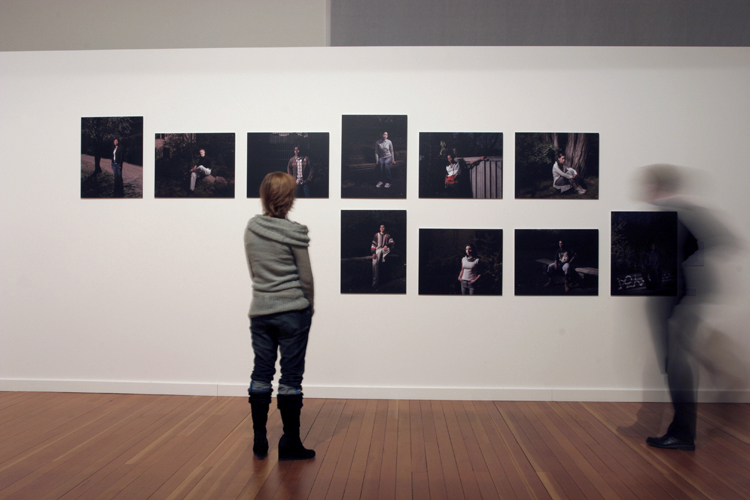
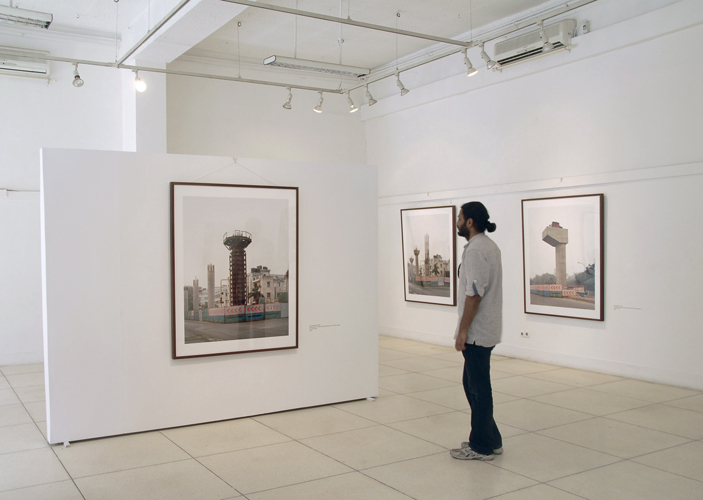
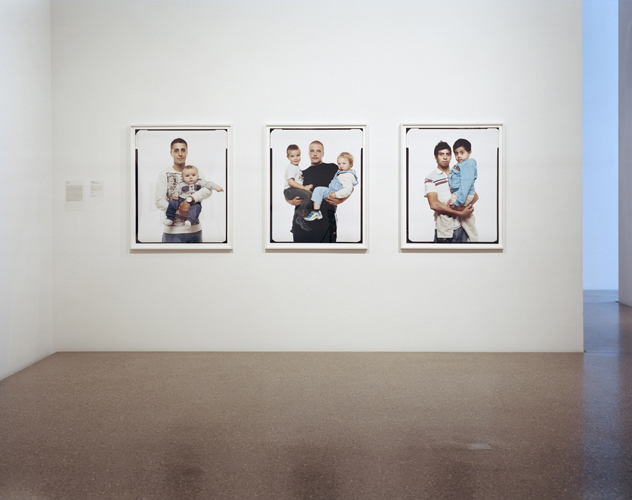
Junge Väter – Ausstellungsansicht
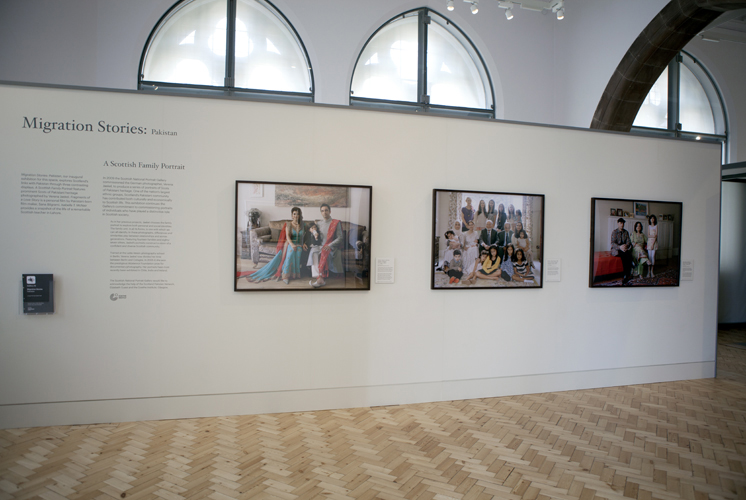
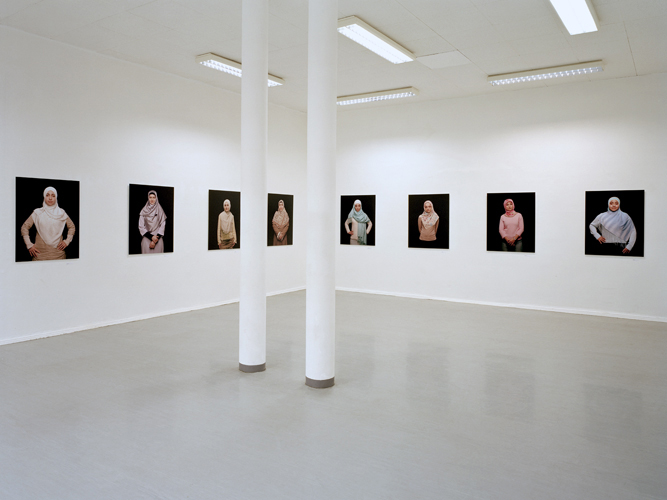
Young Fathers
A portrait series, the Young Fathers project examines the relationship of young fathers to their children.
The topic of young mothers – often dealt with as an issue or problem – receives plenty of public attention. However, there is generally no awareness of the mothers’ partners: the often equally young fathers. It is much harder to perceive or pinpoint them in societal discourse. Moreover, in discussions about young parents these are often dismissed as “cases of social hardship” and framed as a characteristic of the so-called lower classes.
This project aims at bringing these almost invisible young fathers into the limelight. How do these young men deal with their new fatherhood? What sort of relationship do they have to their children? How self-confident, insecure or curious are they about their new role?
The intention of the portrait series Young Fathers is to study the emotional and physical ties between young fathers and their children. In order not to shift the photographic emphasis to the social background of the subjects, this series is purposely photographed in a studio on a white background. This simple, neutral setting works to concentrate the focus on the father-child relationship.
Junge Väter
Bei dem Projekt Junge Väter handelt es sich um eine Portraitserie, die sich mit der Beziehung von sehr jungen Vätern zu ihren Kindern auseinandersetzen möchte.
Junge Mütter werden in der Öffentlichkeit wahrgenommen, thematisiert und oft problematisiert. Ihre Partner – also die meist ebenso jungen Väter – sind im allgemeinen Bewusstsein jedoch kaum präsent. Sie sind im öffentlichen Diskurs sehr viel schwerer zu finden oder wahrzunehmen. Zudem wird die Diskussionen um junge Eltern meist nur einseitig unter dem Schlagwort der „sozialen Härtefälle“ abgetan und vorwiegend als Charakteristik der so genannten unteren Schichten dargestellt.
Dieses Projekt möchte die beinahe unsichtbaren jungen Väter ins Blickfeld rücken. Wie gehen diese jungen Männer mit ihrer Vaterrolle um? Welche Beziehung bauen sie zu ihrem Kind auf? Wie selbstbewusst, unsicher oder neugierig schlüpfen sie in die neue Rolle?
Die Intention der Portraitserie Junge Väter ist es die emotionalen und körperlichen Bindungen zwischen den jungen Vätern und ihren Kindern zu erforschen. Um den fotografischen Schwerpunkt nicht auf das soziale Umfeld der zu fotografierenden Personen zu verschieben, wird diese Serie bewusst im Studio vor weißen Hintergrund fotografiert. Diese neutrale, schlichte Umgebung soll dazu dienen die Konzentrationen der Vater-Kind Bindung zu potenzieren.
Fragments of a Love Story
Sana Bilgrami’s great-grandfather came to Edinburgh from India to study medicine at the turn of the twentieth century. One hundred years later, and now living in Edinburgh herself, Bilgrami pieces together archival traces and fragments of memory to invoke a story of love and sorrow.
Born in Karachi, Pakistan, Sana Bilgrami is an award-winning documentary filmmaker. She studied film at McGill University in Montreal, Quebec, before earning a Masters degree at Edinburgh College of Art when she shot her short film Under my Skin (2001). Bilgrami’s Tree Fellers (2004) was nominated for a BAFTA Scotland award for Best Television Documentary. Her films have been screened on BBC Scotland and STV.
_geduldet. (eng)
The series _geduldet. is made up of 10 portraits of young refugees who, at the time, were staying in Berlin, pending a decision on their asylum claims.
Far from being clichéd photos of refugees, the youth here are shown using the aestheticized imagery evocative of fashion photography. This portrayal is alienating and surprising and is evidently in contrast to the extreme circumstances of the German “stopover” on which these young people find themselves. Having fled one country where a safe and secure life was impossible, a life with “exceptional leave to remain” awaits them: a life in three-month cycles, limited to the bare minimum, accompanied by the constant fear of deportation upon expiry of the next term.
The intention of this work is to show the oppressive life situation of these minors, which contrasts starkly with the needs of adolescence, a time replete with changes along with a yearning for security.
_geduldet.
Die Serie _geduldet. umfasst 10 Portraits jugendlicher Flüchtlinge, die zum Zeitpunkt der Aufnahme mit einer Duldung in Berlin lebten.
Losgelöst von klischeelastigen Flüchtlingsfotos, werden die Jugendlichen in ästhetisierter, der Modefotografie entlehnten Bildsprache gezeigt. Diese Darstellung befremdet und verdeutlicht so den Kontrast zu der extremen Lebenssituation in der „Zwischenstation“ Deutschland, in der sich diese jungen Menschen befinden. Geflohen aus einem Land, das kein sicheres Leben bot, wartet hier das Leben mit einer Duldung: ein Leben im drei-Monats-Rhythmus, beschränkt auf das Notwendigste, mit ständiger Angst vor der Abschiebung nachdem die Frist abgelaufen ist.
Die Intention dieser Arbeit ist es, die beklemmende Lebenssituation der Minderjährigen aufzuzeigen, die im völligen Gegensatz zu den Bedürfnissen der Jugendzeit steht, einer Zeit voller Veränderung und mit der Sehnsucht nach Sicherheit.
Schwestern im Westen (eng)
The portrait series Schwestern im Westen consists of 17 portraits of young Muslim women living in Berlin.
This work shows Muslim women living in Germany from a different angle than the one usually taken by the media: the women in this series all wear their headscarves willingly, self-confidently, and for religious reasons. Yet their decision is not always respected nor accepted. Rather, it is often met with distrust or incomprehension.
This depiction of these women is intended to reveal a further facet of the complex and often conflicting realities which headscarf-wearing Muslim women face, in order to broaden and diversify the image of these women. By doing so, this work aims to challenge the commonly circulated notion that all women who wear headscarves do so only out of pressure and are either oppressed victims or fanatical fundamentalists.
When this project was undertaken in 2003, the topic was very current as the headscarf debate was making headlines. And still today, this project underlines the necessity for communication between Muslims and non-Muslims.
Schwestern im Westen
Bei dem Projekt Schwestern im Westen handelt es sich um eine Portraitserie über 17 junge muslimische Frauen aus Berlin.
In dieser Arbeit werden Musliminnen aus Deutschland anders gezeigt, als sie üblicher Weise in den Medien dargestellt werden: Die hier portraitierten Frauen tragen das Kopftuch aus freiem Willen, selbstbewusst und aufgrund ihres religiösen Glaubens. Ihre Entscheidung wird jedoch nicht immer geachtet oder vielmehr akzeptiert, sondern mit Misstrauen und Unverständnis betrachtet.
Mit der Abbildung dieser Frauen soll eine weitere Facette der komplexen und oft widersprüchlichen Realtitäten kopftuchtragender Musliminnen sichtbar gemacht werden, um so eine Diversifikation und Erweiterung des Bildes muslimischer Frauen mit Kopftuch vorzunehmen. Damit möchte die Arbeit hinterfragen, dass – wie so oft suggeriert – tatsächlich alle Frauen, die ein Kopftuch tragen, dies nur unter Zwang tun, entweder unterdrückte Opfer oder fanatische Fundamentalistinnen sind.
Diese Arbeit gewann im Entstehungsjahr 2003 aufgrund der damalig geführten Kopftuchdebatte an Aktualität. Und auch heute unterstreicht sie die Notwendigkeit der Kommunikation zwischen Muslime und Nicht-Muslime.